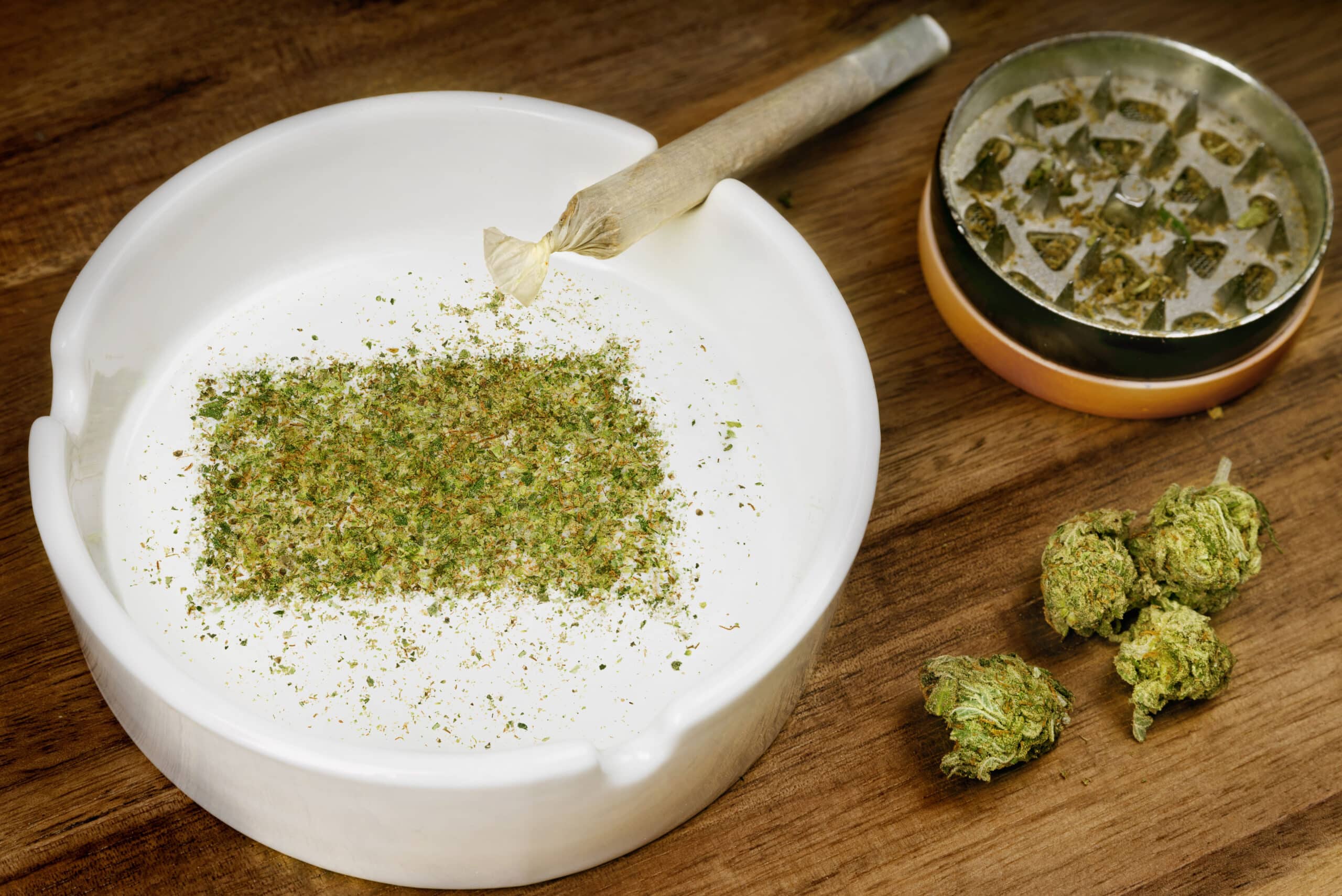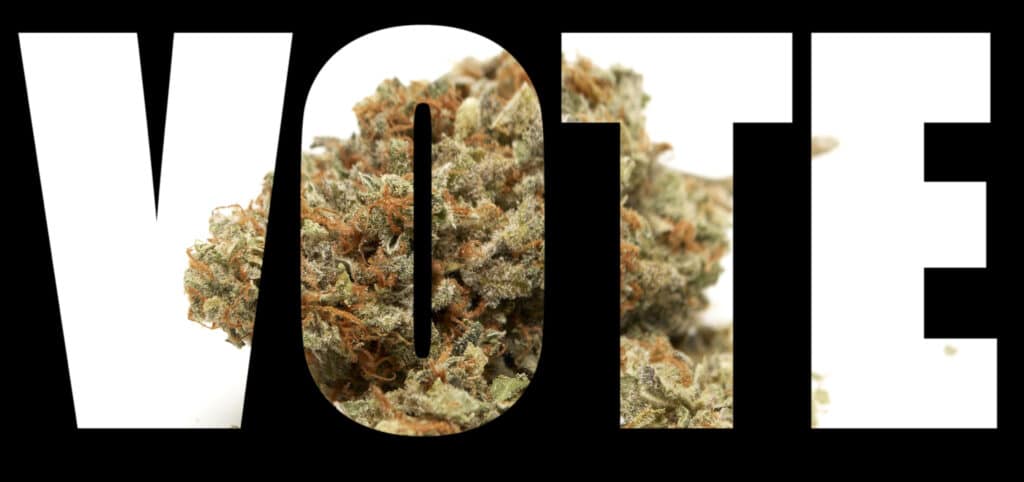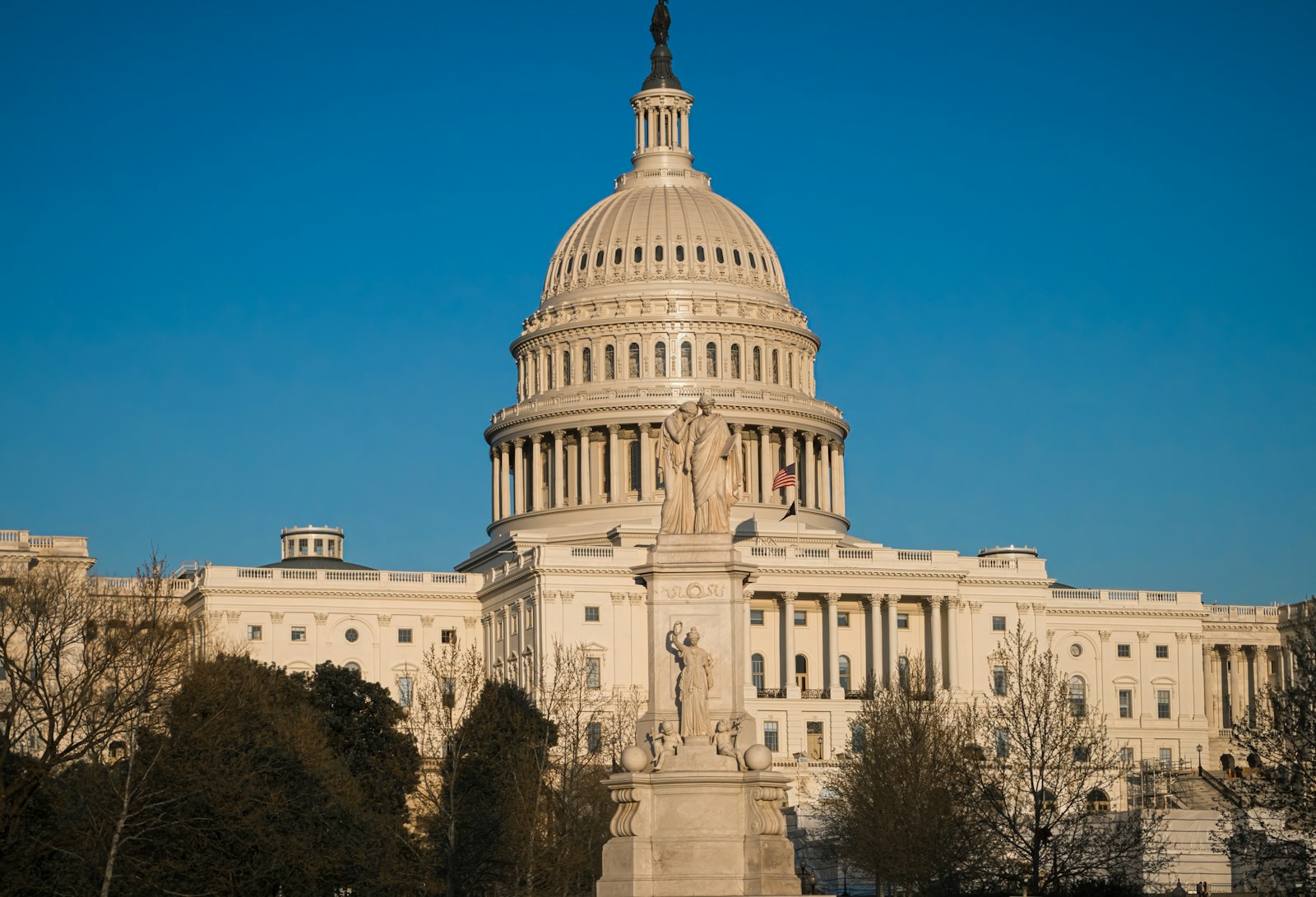Cannabis
Is Kristi Noem Trying to Retract South Dakota Cannabis Legalization…Again?
Published
7 months agoon
By
admin
Poor South Dakota has some of the worst leadership out there. Case in point, Kristi Noem; who seems to be trying to take away yet another voter-approved cannabis legalization.
South Dakota and cannabis
Before getting into the current story, let’s go through the mess of South Dakota and its cannabis legalization measures; and what has already been taken away. In 2020, South Dakota made history by passing two cannabis legalization measures via voter ballot. One for medical, and one for recreational.
Measure 26, a medical legalization law, passed with 70% of voters saying yes. Amendment A, a ballot to institute an adult-use recreational market, also passed with 54% giving it a yes vote. South Dakota was the first state to pass a medical and recreational bill at the same time. However, problems started right away; all pushed by governor, Kristi Noem.
Noem didn’t do everything directly. Instead, she backhandedly conspired with local law enforcement officers Superintendent Rick Miller and Sheriff Kevin Thom. They were the ones that filed a lawsuit to invalidate the recreational win, by saying it broke the single-subject ballot rule. This rule indicates a ballot measure cannot cover more than one topic. Of course, this is automatically strange, as the state supreme court had to approve the language of this (and any) ballot measure, in order to get it onto the ballot. Meaning it was approved before the vote.

The conspiracy between the three was made public on January 8th 2021, when Noem filed an executive order to repeal the recreational win; which made it pretty clear this was all at her behest. Noem had worked hard to keep these measures off the ballot, so this move was in line with her stated opinion of not wanting legal weed in any capacity.
She must have forgotten that a voter ballot isn’t about her opinion. In the end, presiding judge for the case Christina Klinger, ruled in favor of Noem. Klinger had been appointed to her job by Noem earlier. Later in the year, the Supreme Court upheld it, even though arguments against it included that it violated the direct will of the people.
What’s more, Noem didn’t stop with taking away a fairly won voter ballot for recreational weed. She tried to get a bill approved in congress to delay the opening of the medical market for a year later than the enforced date on the ballot, of April 1, 2022. Luckily she did not succeed on this one. Ballot measures are much harder for a legislature to amend since they don’t originate in the legislature. This is likely why she worked to invalidate Amendment A, rather than try to amend it. Basically, the people of the state voted in two measures, and their own governor did everything she could to invalidate their desires.
It gets so weird, that in 2022, South Dakota again held a recreational ballot measure, to make up for the one taken away by its governor. But get this, in a country that only gets more liberal toward weed, and in a state that already passed a legalization measure two years prior (which means two further years of liberalization on this front), somehow, this one didn’t pass. Perhaps Kristi Noem at it again? Working to make sure South Dakotans don’t get a fair legalization…?
Current news on South Dakota and cannabis
The news coming out of South Dakota now, isn’t directly related to Kristi Noem. But, its also really good to remember that when she worked to take away the recreational legalization, she did it quite backhandedly, going through law enforcement, and having them make the official move. So, it suffices to say that its not that out-of-bounds to think that a new policy attempt to remove the medical legalization, is simply Noem at it again.
This time around, the person officially pushing for the retraction, is activist Travis Ismay. Not a member of law enforcement or the legislature. And a guy who brazenly and publicly responded to a country commissioner who explained how medical cannabis helped his dying mother, with the line that he ‘doesn’t care’.

He also, apparently, defended an email with jokes about a clan lynching in his home of Butte Country. His argument against medical cannabis? It might lead to meth… or some crazy nonsense like that. I expect the guy stands by what he says, I also expect he made a great patsy for Kristi Noem; who has been working to take away voter-won cannabis rights since they were won.
Anyway, Ismay filed a petition to get the medical legalization repealed. And he didn’t stop there. This non-politician is also trying to keep future cannabis measures from entering voter ballots. As in, this private citizen wants to take it upon himself to ensure that other private citizens of his state, don’t get their voices heard. Ismay filed this paperwork back in May.
Shockingly (or not, in this state), attorney general Marty Jackley released a summary of the ballot, indicating that if Ismay collects the necessary 17,509 validated signatures, that the measure can be voted on. Luckily this is unlikely, as 70% did pass the original measure back in 2020. However, in a state where legislators and law enforcement continuously stamp on the rights of their residents, it also can’t be ruled out.
New efforts for recreational ballot
If Ismay gets his way, he could prevent future ballot measures for legalization in the state, so long as cannabis is illegal federally. Luckily, activist group South Dakotans for Better Marijuana Laws is both working to block Ismay’s attempts; and gearing up for yet another recreational ballot measure in 2024. Unfortunately, it will not be for 2023. It seems Ohio is the only state with a voter ballot this election season; and it was a difficult process in that state too. There was so much push back from the legislature, it took an extra year.
In terms of dealing with Ismay, executive director of South Dakotans for Better Marijuana Laws, Matthew Schweich, wrote to Secretary of State Monae Johnson, saying, as per Marijuana Moment, “We strongly believe that the rules of our state’s initiative process should be applied consistently to all South Dakotans. Therefore, we respectfully recommend that your office take the following action: revoke Ismay’s approved petition and direct him to refile it.”

Schweich continued that the petition to repeal doesn’t list the statutes meant to be undone; and in place of this, refers to “Exhibit A for the 95 sections that will be repealed.” However, an already existent statute makes clear that any petition must contain “the full text of the initiated measure.”
Explained Schweich, “Our interpretation of this statute is that a reference to additional text, in this case an exhibit, is not permissible. And even if a reference were permitted, in this instance ‘Exhibit A’ is not included anywhere on the petition. Furthermore, ‘Exhibit A’ is never defined in any previous initiative-related filing by Ismay with your office, the South Dakota Legislative Research Council, or the South Dakota attorney general.”
As of right now, South Dakota has 11,500 medical cannabis card holders. The expected number by 2024, wast 6,000; which shows medical cannabis is more popular than what the state predicted. By almost double. A retraction of the medical cannabis law would mean leaving these people who just won the right to have their medicine; completely without it. Talk about a state that really looks after its people! I guess Kristi Noem probably prefers that people take opioids. Or perhaps whatever opioid alternative is made by Sanford Health, her biggest contributor from 2009-2018.
Conclusion
Should South Dakota residents be afraid of losing their medical cannabis legalization? You’d think the answer would be a clear ‘no’ with a voter ballot that passed with 70% of the vote in 2020, and nearly twice as many medical patients as expected already enrolled. But in a state like South Dakota, this cannot be said for sure; as the governance has repeatedly gone out of its way, to trample on the well won rights of its people.
Hello weed supporters! Thanks for making your way to Cannadelics.com; a top choice for independent coverage of the drugs world at large, with a focus on cannabis and psychedelics. Join us frequently to stay in-the-loop; and sign up for the Cannadelics Weekly Newsletter; for an awesome range of product promos as well.
Related
You may like
Cannabis
Senate Leadership Pushes End of Federal Prohibition Of Cannabis
Published
2 days agoon
May 3, 2024By
admin
In a big week for the marijuana industry and a surprise to most of the industry, Senators Schumer (D-NY), (Murray D-WA), Wyden (D-OR), Cory Booker (D-NJ) and 14 others have deduced to follow the public and make a change. As of today, Senate leadership pushes end of federal prohibition of cannabis.
Senator Patty Murray, a senior member and former Chair of the Senate Committee on Health, Education, Labor, and Pensions (HELP) has long been a champion of veterans. This falls in line with PTSD treatments and with the American Medical Association’s backing of rescheduling and more medical research to see how the cannabis plant can help more patients.
RELATED: California or New York, Which Has The Biggest Marijuana Mess
They have reintroduced the Cannabis Administration and Opportunity Act (CAOA), legislation that would end the harmful federal prohibition of cannabis by removing cannabis from the list of federally controlled substances and empowering states to create their own laws. This legislation would be a historic step toward rectifying the failed policies of the War on Drugs and would help federal law better reflect the will of the vast majority of Americans, 91% of whom believe that cannabis should be legalized for either adult or medical use.
“It is far past time that the federal government catch up to Washington state when it comes to cannabis laws. This legislation is about bringing cannabis regulations into the 21st century with common-sense reforms to promote public safety and public health, and undo deeply unjust laws that have for decades disproportionally harmed people of color,” said Senator Murray. “The Cannabis Administration and Opportunity Act will help set us on a safe and responsible pathway to legalization—I’ll keep working to secure the necessary support to get it done.”

The Cannabis Administration and Opportunity Act establishes a federal regulatory framework to protect public health and safety, prioritizes restorative and economic justice to help undo harm caused by the War on Drugs, ends discrimination in the provision of federal benefits on the basis of cannabis use, provides major investments for cannabis research, and strengthens worker protections. By decriminalizing cannabis at the federal level, the CAOA also ensures that state-legal cannabis businesses or those in adjacent industries will no longer be denied access to bank accounts or financial services simply because of their ties to cannabis.
The Cannabis Administration and Opportunity Act:
- Protects public health by:
- Establishing a Center for Cannabis Products to regulate production, labeling, distribution, sales and other manufacturing and retail elements of the cannabis industry.
- Instructing the FDA to establish standards for labeling of cannabis products, including potency, doses, servings, place of manufacture, and directions for use.
- Establishing programs and funding to prevent youth cannabis use.
- Increasing funding for comprehensive opioid, stimulant, and substance use disorder treatment.
- Protects public safety by:
- Removing cannabis from the Controlled Substances Act and eliminating federal prohibitions in states that have chosen to legalize medical cannabis, or adult-use cannabis.
- Retaining federal prohibitions on trafficking of cannabis in violation of state law; establishing a grant program to help departments combat black market cannabis.
- Requiring the Department of Transportation (DOT) to create standards for cannabis-impaired driving.
- Directing the National Highway Traffic Safety Administration (NHTSA) to collect data on cannabis-impaired driving, create educational materials on “best practices,” and carry out media campaigns.
- Incentivizing states to adopt cannabis open container prohibitions.
- Regulates and taxes cannabis by:
- Transferring federal jurisdiction over cannabis to the Alcohol and Tobacco Tax and Trade Bureau (TTB).
- Eliminating the tax code’s restriction on cannabis businesses claiming deductions for business expenses, and implementing an excise tax on cannabis products.
- Establishing market competition rules meant to protect independent producers, wholesalers, and retailers and prevent anti-competitive behavior.
- Encourages cannabis research by:
- Requiring the Government Accountability Office (GAO) to study and report on metrics that may be impacted by cannabis legalization.
- Requiring the Department of Health and Human Services (HHS) and National Institutes of Health (NIH) to conduct or support research on the impacts of cannabis.
- Requiring the VA to carry out a series of clinical trials studying the effects of medical cannabis on the health outcomes of veterans diagnosed with chronic pain and post-traumatic stress disorder.
- Requiring the Bureau of Labor Statistics to regularly compile and publicize data on the demographics of business owners and employees in the cannabis industry.
- Establishing grants to build up cannabis research capacity at institutions of higher education, with a particular focus on minority-serving institutions and Historically Black Colleges and Universities.
- Prioritizes restorative and economic justice by:
- Using federal tax revenue to fund an Opportunity Trust Fund to reinvest in communities and individuals most harmed by the failed War on Drugs.
- Establishing a Cannabis Justice Office at the Department of Justice’s Office of Justice Programs
- Establishing a grant program to provide funding to help minimize barriers to cannabis licensing and employment for individuals adversely impacted by the War on Drugs.
- Establishing expedited FDA review of drugs containing cannabis manufactured by small businesses owned by socially and economically disadvantaged individuals.
- Directing the Secretary of Housing and Urban Development to establish a grant program to provide communities whose residents have been disproportionately affected by the War on Drugs with additional funding to address the housing, economic, and community development needs of such residents.
- Initiating automatic expungement of federal non-violent cannabis offenses and allows an individual currently serving time in federal prison for nonviolent cannabis offense to petition a court for resentencing.
- Disallowing the denial of any benefits or protections under immigration law to any noncitizen based on their use or possession of cannabis.
- Prevents discrimination in the provision of federal benefits against people who use cannabis.
- Strengthens workers’ rights by:
- Removing unnecessary federal employee pre-employment and random drug testing for cannabis
- Ensuring worker protections for those employed in the cannabis industry.
- Establishing grants for community-based education, outreach, and enforcement of workers’ rights in the cannabis industry.
RELATED: Cannabis Industry Employs The Same As These Companies
The Cannabis Administration and Opportunity Act is co-sponsored by U.S. Senators Jeff Merkley (D-OR), Kirsten Gillibrand (D-NY), Elizabeth Warren (D-MA), Ed Markey (D-MA), Michael Bennet (D-CO), Gary Peters (D-MI), Tina Smith (D-MN), John Hickenlooper (D-CO), Ben Ray Luján (D-NM), Alex Padilla (D-CA), Peter Welch (D-VT), Rev. Raphael Warnock (D-GA), John Fetterman (D-PA), and Laphonza Butler (D-CA).
Senator Murray has been a leader on common-sense cannabis reforms. She helped introduce the Cannabis Administration and Opportunity Act last Congress, and in 2017, she first introduced the Secure and Fair Enforcement (SAFE) Banking Act which would allow state-legal cannabis businesses to access banking services. She has reintroduced the bill multiple times and is pushing hard for its passage. An updated version of the legislation—the Safe and Fair Enforcement Regulation (SAFER) Banking Act of 2023, which Murray also cosponsored—passed through committee after a bipartisan markup last fall.

House racing is highly popular sports with over 45,000 races run in the US and Canada last year. The Kentucky Derby is the pinnacle of horse racing in North America, but most major metro hubs have some type of opportunity. Globally it is a $400 billion industry with tens of millions of people watching. But are they off to the horse races with cannabis?
RELATED: How To Be Discreet When Using Weed
The biggest horse racing party is the Kentucky Derby and the Infield (the area inside the track) is a huge one with beer trucks, Mardi Gras bead shenanigans, and maybe a little whiff of weed. While Churchill Downs, where the race is run, bans all smoking, vapes, gummies and more make the way in. The same is true across the realm. But what about those in the race?

Horse racing is an intense activity for the animal, and increasingly, horse owners are adapting human products (either medical marijuana or hemp) for their athletes. Recovery, hydration, inflammation and pain management are all benefits for the horse if done with the correct dosage. Additionally, it is seen as a potential for calming a horse.
Like the human mass market, CBD is leading the way. But the efficacy and safety of some products is questionable, due to very little research and supervision. Until the passage of the 2018 Farm Act, it was illegal to possess or conduct research on hemp as well as marijuana. Like the NFL, owners should be aware CBD and THC cannot be used in when competing, and if CBD shows up on a drug test that horse may be disqualified.
RELATED: The Most Popular Marijuana Flavors
With rescheduling, there should be more research done regarding CBD and THC’s benefits to animals, especially pets and horses. Before administering CBD to horses, horse owners should first consult with a veterinarian.
Additionally, jockeys are banned from using cannabis while racing. This falls inline with the current global sports guidelines. CBD has been used in helping with recovery, but it can not be used prior to the race, especially if you are looking at winning.
Andrew Cooper
The Future Of Cannabis After Rescheduling
Published
2 days agoon
May 3, 2024By
admin
The Cannabis world is going through another big change with the potential of rescheduling – but what does it really mean?”
The Fresh Toast – The cannabis world is going through another major change, so what is the future of cannabis after rescheduling?
The Drug Enforcement Administration (DEA) is moving for cannabis to be rescheduled. The anticipated rescheduling follows the Department of Health & Human Services’ (HHS) August 2023 recommendation, based on scientific support for the rescheduling from the FDA, that cannabis be rescheduled under Schedule III of the Controlled Substances Act. Cannabis has remained a Schedule I substance since it was originally “temporarily” classified as such by the Controlled Substances Act of 1970. Schedule I drugs are defined as having no currently accepted medical use and a high potential for abuse, with other Schedule I drugs including heroin and LSD (despite cocaine, fentanyl, and other potentially dangerous drugs being in less restrictive drug schedules). The status of cannabis as a Schedule I drug has long been criticized, particularly as more and more U.S. states legalized cannabis for medical and recreational use.
RELATED: Beer Sales Flatten Thanks To Marijuana
From a consumer standpoint rescheduling will not actually legalize cannabis. At least not in a way forcing States in which cannabis is currently prohibited to immediately change course as a direct result of rescheduling. Instead, those States are likely to continue cannabis prohibition (though this momentous step may influence further states to legalize). Similarly, states with state-legal cannabis programs will likely not immediately change from a consumer perspective, although further regulation or even a reduction in product pricing due to cannabis no longer being subject to section 280E of the Internal Revenue Code (discussed in detail below) may soon follow.

There is more going on the business side with rescheduling. Falcon Rappaport & Berkman LLP has reviewed the process and outcomes.
Taxes
The most significant consequence of cannabis rescheduling will be the immediate removal of cannabis from the reach of I.R.C. Section 280E, which is arguably the greatest burden on state-legal cannabis operators. Section 280E prohibits cannabis businesses from writing off many business expenses when calculating their net profit, which has resulted in vastly higher taxes as compared to similar non-cannabis businesses. Instead, section 280E only permits a deduction for the Cost of Goods Sold (COGS) for any business trafficking in any controlled substances (i.e., drugs listed on Schedule I or Schedule II). Despite cannabis businesses operating under state-legal programs, they are considered “trafficking” and cannot take ordinary business deductions. Allowing cannabis businesses to deduct all ordinary and necessary business expenses, and not just COGS, will help to even the playing field with nearly every other legal business.
Federal Illegality
As discussed from a consumer standpoint, rescheduling cannabis does not affect the overall federal illegality of cannabis. This means that state-legal cannabis businesses will not automatically be federally legal, as their federal illegality will continue under Schedule III. While Schedule III drugs may be legally prescribed and sold under federal law, the various restrictions (such as requiring FDA approval of any such Schedule III drug and DEA registration of a distributor) mean that your average dispensary, even medical dispensaries, will still be federally non-compliant. For these same reasons, the reclassification to Schedule III does not mean that marijuana grown pursuant to state programs can be sold in interstate commerce. Marijuana products, even under Schedule III, are only federally legal if they are federally approved and there are only three FDA-approved cannabis-based drugs developed to date (Marinol, Epdiolex, and Syndros).
RELATED: Cannabis Industry Employs The Same As These Companies
Intellectual Property & Cannabis Trademarks
The United States Patent and Trademark Office (USPTO), the agency tasked with examining federal trademark applications, has generally required use of a mark to be lawful under federal law in order to receive federal trademark registration under the U.S. Trademark Act (see Examination Guide 1-19). The federal illegality of cannabis has thus prevented trademark registration in connection with most cannabis products. Unfortunately, cannabis rescheduling will not remedy this issue. Even in Schedule III, cannabis products would have to be federally lawful, with lawful use of a Schedule III drug requiring FDA approval.
Entitlement to Federal Bankruptcy Protection
Currently, plant-touching cannabis companies are not entitled to federal bankruptcy protection. That is because the U.S. Bankruptcy Code requires that bankruptcy plans are “proposed in good-faith and not by any means forbidden by law.” Since even state-regulated cannabis companies violate the federal Controlled Substances Act (CSA), they are disqualified. Unfortunately, rescheduling to Schedule III of the CSA alone will not likely solve that barrier to bankruptcy. While some have argued otherwise, the fact is that to manufacture, distribute, or dispense a Schedule III Controlled Substance, businesses must be registered with the Drug Enforcement Administration (“DEA”). Any business or person not registered with the DEA is not authorized to manufacture, distribute, or dispense it. Meaning that violations would likely constitute an unlawful act under the CSA. Consequently, an attempt by the non-complying business to commence a voluntary petition seeking federal bankruptcy protection will likely result in a motion to dismiss the case by the U.S. Trustee’s Office.
However, in light of a recent trend among bankruptcy court’s in allowing ‘one-step-removed’ distribution of cannabis-related assets, federal rescheduling may very well result in a more liberalized approach to administering bankruptcy cases so that bankruptcy judges will be more willing to look past the issue of marijuana’s federal illegality.
Status Quo
There are several aspects of the existing cannabis industry which would not be immediately changed by rescheduling cannabis to Schedule III. Ongoing banking issues including the lack of access to standard commercial bank loans and lines of credit would likely persist; difficulties in processing cannabis transactions due to the reality that major credit card companies like Visa, Mastercard and others will likely still not service marijuana businesses; general federal illegality; and the criminalization of cannabis (and continued incarceration of certain offenders) in prohibitive states would remain following rescheduling.
While many had hoped for the de-scheduling of cannabis, the change in stance of the DEA, a longstanding adversary of cannabis reform, is no small feat.
Terran Cooper is a regular contributor to The Fresh Toast. He is part of Falcon Rappaport & Berkman LLP. This article was developed in part with the help of Andrew Cooper and Matthew Foreman.

Did the Death of the Lazy Stoner Stereotype Push Cannabis Rescheduling Forward?

How Not to Roll a Joint : Common Blunders Beginners Make

Cannabis Makes Gym Workouts More Fun Says New Fitness Study

Marijuana backers eye proposed federal regulatory change as an aid to legalizing pot in more states

Senate Leadership Pushes End of Federal Prohibition Of Cannabis

Off To The Horse Races With Cannabis

The Future Of Cannabis After Rescheduling

A Happy Hippie’s Journey of Love, Cannabis, and Self-Discovery

But What about the UN Drug Treaties?

The Best Tips To Up Your Intimacy Game While High

Distressed Cannabis Business Takeaways – Canna Law Blog™

United States: Alex Malyshev And Melinda Fellner Discuss The Intersection Of Tax And Cannabis In New Video Series – Part VI: Licensing (Video)

Drug Testing for Marijuana – The Joint Blog

What you Need to Know

Cannabis, alcohol firm SNDL loses CA$372.4 million in 2022

NCIA Write About Their Equity Scholarship Program

City Of Oakland Issues RFP For Employee Training Programs

It has been a wild news week – here’s how CBD and weed can help you relax

A new April 20 cannabis contest includes a $40,000 purse

UArizona launches online cannabis compliance online course
Trending
-

 Cannabis News1 year ago
Cannabis News1 year agoDistressed Cannabis Business Takeaways – Canna Law Blog™
-

 One-Hit Wonders1 year ago
One-Hit Wonders1 year agoUnited States: Alex Malyshev And Melinda Fellner Discuss The Intersection Of Tax And Cannabis In New Video Series – Part VI: Licensing (Video)
-

 drug testing5 months ago
drug testing5 months agoDrug Testing for Marijuana – The Joint Blog
-

 Cannabis 1011 year ago
Cannabis 1011 year agoWhat you Need to Know
-

 Marijuana Business Daily1 year ago
Marijuana Business Daily1 year agoCannabis, alcohol firm SNDL loses CA$372.4 million in 2022
-

 Education1 year ago
Education1 year agoNCIA Write About Their Equity Scholarship Program
-

 Education1 year ago
Education1 year agoCity Of Oakland Issues RFP For Employee Training Programs
-

 Cannabis1 year ago
Cannabis1 year agoIt has been a wild news week – here’s how CBD and weed can help you relax



